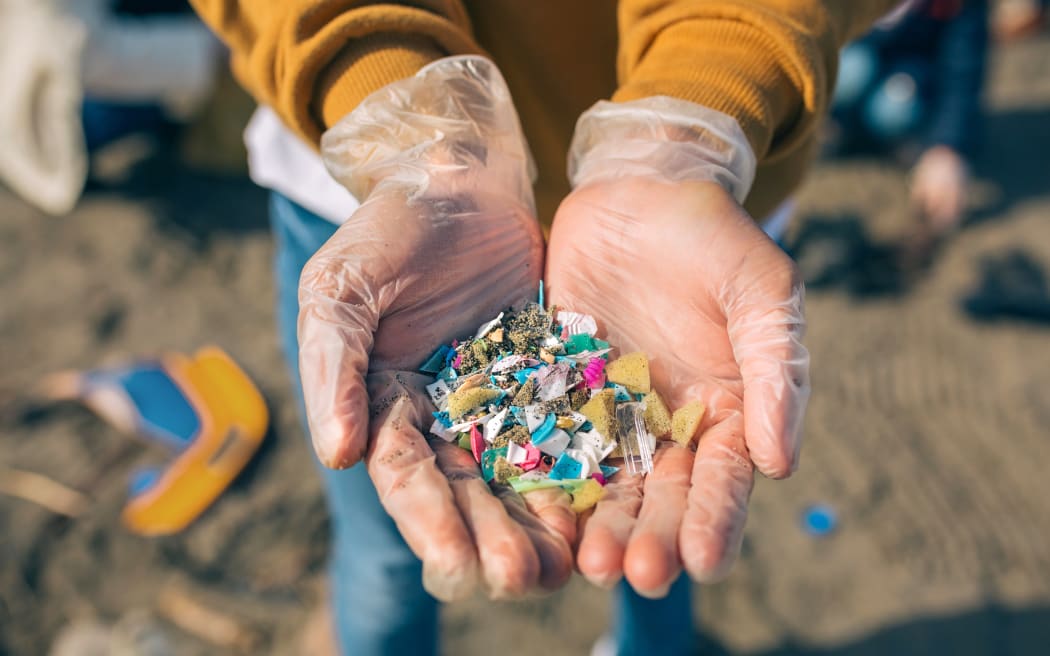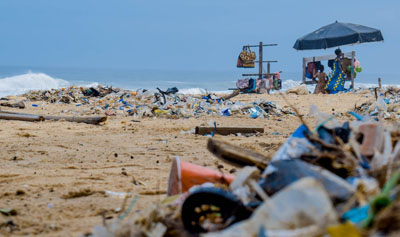Plastic pollution is an environmental challenge of global concern. More and more countries continue to upgrade the "plastic restriction" measures, actively develop and promote alternative products, continue to strengthen policy guidance, enhance the awareness of enterprises and the public on the hazards of plastic pollution and their awareness of participating in plastic pollution control, and promote green production and lifestyles .
— 1 —
France phases out single-use plastic packaging
From January 1, 2023, French fast food restaurants will usher in new "plastic restriction" regulations-disposable plastic tableware must be replaced with reusable tableware. This is another new regulation in France to restrict the use of plastic products in the catering field since the prohibition of the use of plastic packaging boxes and the prohibition of providing plastic straws.
In the major supermarkets in France, people can really feel the details of reducing the use of plastic products: most of the product labels clearly indicate their sorting and recycling methods; electronic products are marked with information on whether they can be repaired and the parts required for repair, which will be used for subsequent products. Recycling provides reference; supermarkets also encourage bulk sales and reduce packaging. From 2021, more than 30 kinds of fruits and vegetables such as cucumbers and oranges in French supermarkets will no longer be packaged with plastic film, and consumers can bring reusable utensils to buy bulk products.
The French Ministry of Ecological Transition pointed out that the weight of packaging for daily necessities sold in France every year is about 5.5 million tons, of which 20% are plastic packaging, and are usually disposable. France is gradually increasing the product share of reusable packaging, with the goal of reaching 5% of reusable packaging products on the market by 2023 and 10% by 2027.
"Manufacturers should reduce excessive packaging from the source, local governments should improve the garbage classification system in public places, and carry out popular science actions for consumers to further increase the recycling rate of garbage." The French Consumer Association pointed out that the problem of excessive plastic packaging in France is prominent, The proportion of plastic recycling needs to be improved.
In recent years, France has stepped up efforts to limit plastics and passed the Law Against Waste for Circular Economy, which aims to gradually reduce the use of disposable plastic products, promote the development of alternative and reusable materials, ban disposable plastic packaging, promote Unpackaged sales, etc., to promote the realization of the national ecological transformation goal. The law lays out a roadmap for the complete ban on disposable plastic packaging: achieve 100% recycling of plastic products by 2025, and strive to reduce unnecessary disposable plastic packaging; reduce the sales of disposable plastic bottles by half by 2030 . The bill takes five years as a measurement period, quantitatively adjusts the corresponding policies according to the actual situation, and finally achieves the goal of reducing the use rate of disposable plastic products to zero by 2040.

— 2 —
Thailand steps up public-private partnerships to reduce plastic use
In order to deal with the problem of plastic waste, Thailand has been continuing to promote the "Roadmap for Managing Plastic Waste 2018-2030". The roadmap adheres to the principle of "use less, reuse and recycle", strengthens public-private cooperation, promotes responsible consumption and production, and realizes a circular economy. According to the roadmap, Thailand will ban the use of plastic microbeads, oxo-degradable plastics and other plastic products by the end of 2019, stop using lightweight plastic bags, plastic straws, foam food boxes, plastic cups, etc. Achieving the goal of 100% recycling of plastic waste. At the end of November 2019, Thailand approved the "Plastic Ban" proposal proposed by the Ministry of Natural Resources and Environment. From January 1, 2020, major shopping centers and convenience stores will be prohibited from providing disposable plastic bags.
Public-private cooperation is an important part of Thailand's promotion of "plastic restriction". In 2018, under the "Public-Private Partnership for Plastics and Waste Management" program, the government and public agencies, the private sector, academia, and civil organizations cooperated to jointly manage plastics and waste, with the main goal of reducing the use of plastic products and Reuse plastic waste. Under the plan, Thailand has increased plastic waste collection points; industrial manufacturers have established the "Thailand Plastic Circulation Alliance" to recycle, manage and reuse plastic waste generated in the manufacturing process; dozens of leading Thai companies have formed sustainable development in Thailand The Business Council, cooperates with the Thailand Environmental Research Institute and others to carry out environmental protection practices and raise public awareness of environmental issues.
Currently, the Thai Retailers Association cooperates with shopping malls, supermarkets, convenience stores, etc. to stop providing plastic bags on the fourth day of each month, and consumers who do not use plastic bags can get reward points. This activity has reduced the use of about 2 billion plastic bags in 2019 alone. After the "Plastic Restriction Order" was passed, the Thai Retailers Association and the government cooperated to launch a "Say No to Plastic Bags Everyday" campaign. About 24,500 distribution channels of the association's 75 members started from January 1, 2020. Plastic bags will no longer be provided.
Thailand will ban the import of plastic waste by 2025. The first phase will start in 2023, and the amount of plastic waste to be restricted will be determined based on actual production capacity; from 2024, only 50% of plastic waste will be allowed to be imported; until 2025, the import of all plastic waste will be completely banned. Thailand's Minister of Natural Resources and Environment Warau Wu said that this is an important step for Thailand to get rid of plastic waste.

— 3 —
Germany increases recycling rate to promote circular economy
When you walk into any supermarket in Berlin, you can always see customers with large bags of empty bottles busy in front of the bottle return machine at the entrance. Soft plastic bottles cost 0.25 euros, and hard plastic bottles cost 0.15 euros... After all the bottles are placed, customers will Received a supermarket voucher which was also a deposit already paid for bottled drinks. Today, this set of empty bottle recycling policy has become a unique example of circular economy in Germany.
The plastic bottles recycled by these supermarket bottle return machines participate in the circular economy in different forms: the hard plastic bottles are sorted and collected by professional recycling companies, and shipped to beverage manufacturers. After cleaning, disinfection and refilling, this plastic bottle It can be reused about 25 times; soft plastic bottles (PET plastic bottles) are compressed and packaged and sent to plastic recycling companies, where they are shredded and reduced into plastic particles, which are used to make new plastic bottles, textiles or other plastic products. According to statistics from the German Packaging Market Research Association, 34% of recycled PET plastic bottles are used to produce new beverage bottles, 27% are used to produce plastic packaging bags, 22.6% are used to produce textile fabrics, and 16.4% are used for others. The recycling rate reaches 93.4%.
Thomas Fischer, head of the circular economy of the environmental protection organization "German Environmental Action", said that the recycling rate of empty bottles in Germany has exceeded 98%. This successful experience has given birth to new business innovations. In addition to beverage bottles, some companies have also introduced containers for recycling sanitary products.
In Germany, plastic beverage bottles will be marked with 100% renewable plastics in eye-catching positions. Food packaging bags such as biscuits, snacks, and pasta have also begun to use renewable plastics in large quantities. Plastic boxes and trays are also made of recycled plastic.
The continuous increase in the recycling rate of plastics in Germany is not only related to the increasing popularity of environmental protection concepts, but also to the increasingly tightened product packaging laws in Germany and the European Union. Against the backdrop of high energy prices, the process is accelerating. At present, Germany is trying to further promote "plastic restriction" in terms of reducing the amount of packaging, advocating the implementation of reusable packaging, expanding high-quality closed-loop recycling, and setting mandatory recycling indicators for plastic packaging. Germany's move is becoming an important standard for the European Union.

— 4 —
Austria Supermarkets to fully introduce deposit system for plastic bottles and cans
In the fight to reduce waste and promote a circular economy, the Austrian government is revising two measures that directly affect the retail sector. From January 2024, supermarkets will be obliged to provide 10% to 15% of their volume in reusable packaging for beer, water, juice, milk and soft drinks.
In addition, in order to achieve the EU's target, a deposit system for plastic bottles and cans will be introduced in 2025. This mandates the collection of 77% of single-use plastic bottles by 2025 and even 90% by 2029. 110 million euros for the switch to one-time deposits and reusable bottles According to a statement, the supermarket chain Hofer is now the first discount store in Austria to invest in the recycling of beverage containers, and together with circular economy leader "Tomra", Provide their consumers with an empty container return machine (like returning milk carafes).
Plastic bottles and jars can cost up to 30 cents for a deposit. "This service is not only good for the environment, but also has a positive impact on customers!" According to the supermarket, in Austria, a considerable amount of 63,000 tons of cans and plastic bottles are sent every year into an environmentally friendly circular economy, which can be said to kill two birds with one stone.
— 5 —
U.K. Supermarkets to fully introduce deposit system for plastic bottles and cans
The UK government has recently launched plans to implement a deposit system in England, Northern Ireland and Wales, starting from 1 October 2025. After the British Department of Environment, Food and Rural Affairs (DEFRA) completes its consultation on the regulations, its deposit system regulations will be implemented at the end of 2023, and the deposit system will officially start on October 1, 2025.
DEFRA confirmed that the deposit system in England and Northern Ireland would cover PET, steel and aluminum beverage containers, but not glass bottles, as their governments felt it would add complexity and challenges, particularly in the retail and hospitality sectors. And the mechanics in Wales will include glass bottles. The solvents in the containers covered by the three regions are all 50 ml to 3 liters.
Another step is for the government to appoint a deposit management organization, with a deadline of summer 2024. The collection rate target is 90% for the first three-year reporting period and annually thereafter.

— 6 —
Australia Victoria will ban disposable plastic products
According to the "Daily Mail" report on January 27, Victoria, Australia will ban the use of disposable plastic products from February 1, 2023, including tableware, straws and other items. If the enterprise violates the law, it will be fined up to 54,000 US dollars (about 366,000 yuan).
According to reports, from February 1, it will be illegal to supply or sell single-use plastic straws, drink stirrers, cutlery, plates and cotton swab sticks in the Australian state of Victoria. Businesses caught using these items will be fined $1,849. Under the ban, businesses could face fines of up to $54,000 (about 366,000 yuan), but only in rare cases, such as when businesses knowingly sell single-use plastic products as reusable items. Individuals could face a $370 fine for violating the rules, though the government says only those who violate the rules repeatedly will be penalized.




